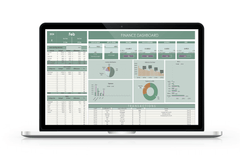You work hard, get paid, and yet—somehow—your bank balance never reflects all that effort. It feels like money just slips away, leaving you wondering where it all went. Sound familiar?
One key principle to understand is this: It’s not about how much you earn—it’s about how much you keep. You can earn £5k a month and have only £200 left at the end of the month, feeling relieved that at least you have enough to survive until payday. Meanwhile, someone earning £2.8k a month might have £1,000 left over to invest or build future financial security. The difference isn’t in how much you make—it’s in how much you keep and optimize.
Most people focus on increasing their income, but even high earners can struggle financially if they don’t manage their money wisely. The key isn’t just budgeting harder—it’s about structuring your income in a way that lets you enjoy life while still building financial security.
The Real Problem: Income Leaks & Lifestyle Inflation
Ever noticed how, when you start earning more, you automatically start spending more? That’s called lifestyle inflation—and it’s one of the biggest reasons why even a good salary can disappear quickly.
The issue isn’t that you’re spending—it’s that money is being spent without a plan. When you don’t track where your income goes, it tends to vanish into impulse buys, subscriptions, dining out, and other non-essentials.
A Smarter Way to Structure Your Income
To get control over your finances, you need a strategic income distribution plan—one that ensures your essential expenses are covered, your savings are growing, and your lifestyle spending is intentional.
One commonly suggested method is the 50/30/20 rule, which suggests:
-
50% Needs – Rent, utilities, food, healthcare, transportation
-
30% Wants – Dining out, entertainment, travel, hobbies
-
20% Savings & Debt Repayment – Investments, emergency fund, retirement contributions, debt payments
However, this structure isn’t one-size-fits-all. More importantly, it reflects a common spending trend—the tendency to match societal expectations, often influenced by marketing, media, and peer behaviors. There’s an unspoken pressure to allocate a certain percentage of our income to socializing, designer brands, trendy accessories, and other lifestyle choices. But is this truly necessary? None of these expenses are mandatory. The real question is: Are you spending based on your own values and priorities, or are you letting external influences dictate your financial decisions?
Income Distribution for Self-Employed Individuals
If you're self-employed, managing income can feel unpredictable. Unlike salaried employees with consistent paychecks, freelancers and entrepreneurs must allocate funds strategically to ensure financial stability.
A recommended breakdown for self-employed professionals:
-
50% Business & Living Expenses – Taxes, rent, software, insurance, basic personal expenses
-
25% Savings & Investments – Emergency fund, retirement, tax savings
-
15% Reinvestment in Business – Growth opportunities, marketing, professional development
-
10% Personal Discretionary Spending – Entertainment, travel, dining out
Since income fluctuates, aim to build a buffer fund during high-earning months to cover lower-income periods. Automate tax savings so you’re not caught off guard when payments are due.
RELATED: Personal FInance Tracker in Excel with Savings Fund Tracker and more
Rethinking ‘Wants’: A Hidden Opportunity to Build Wealth
Instead of treating the 30% as a set rule, ask yourself:
-
Do I really need to spend 30% of my income on non-essentials?
-
What if I cut that to 20% or even 15%—where could I put that extra money?
Here’s what reducing your ‘wants’ spending could do for you:
✅ More Savings & Investments – Even redirecting $200/month to investments could turn into $122,000 in 20 years with a 7% return.
✅ Faster Debt Freedom – Paying an extra $100/month on credit card debt could save you thousands in interest.
✅ More Financial Security – With extra savings, unexpected expenses become manageable instead of stressful.
RELATED: Ultimate Finance Tracker in Excel
How to Cut ‘Wants’ Without Feeling Deprived
1️⃣ Find Cost-Effective Alternatives – Love coffee shop lattes? Try making gourmet coffee at home. Love dining out? Set a fun “restaurant night” at home instead.
2️⃣ Reevaluate Recurring Expenses – Cancel unused subscriptions, switch to lower-cost services, or negotiate better rates.
3️⃣ Prioritize Value-Driven Spending – If travel is your passion, cut back on shopping to afford more trips. Spend intentionally, not impulsively.savings
4️⃣ Gamify Your Savings – Challenge yourself to reduce spending in small areas and track how much you “win” by keeping that money instead.
Transforming Financial Habits for Long-Term Success
Building wealth isn’t just about cutting expenses—it’s about changing financial habits that create long-term stability.
✔ Automate Savings – Set up automatic transfers to savings and investment accounts so you’re consistently growing your wealth.
✔ Track Your Spending – Use budgeting apps to monitor cash flow and identify areas for improvement.
✔ Invest in Financial Education – Read books, listen to podcasts, or take courses to improve money management skills.
✔ Adopt a Growth Mindset – View financial discipline as a tool for freedom, not restriction.
✔ Set Clear Financial Goals – Whether it’s home ownership, travel, or early retirement, having defined goals makes budgeting more motivating.
Your Money, Your Freedom
At the end of the day, your income is a tool. How you structure it determines whether you stay stuck in financial stress or move toward financial freedom.
By questioning every expense and taking control of your ‘wants’ spending, you can unlock a future where your money works for you—not the other way around.
Final Thought: It’s Not About Earning More—It’s About Keeping More
Your financial success doesn’t depend on making six figures—it depends on how wisely you manage what you already earn. So, where can you start optimizing today?
🚀 Challenge: Find one ‘want’ you can reduce this month and redirect that money into savings or investments. Your future self will thank you!
